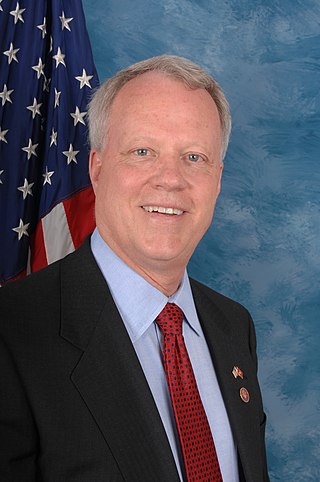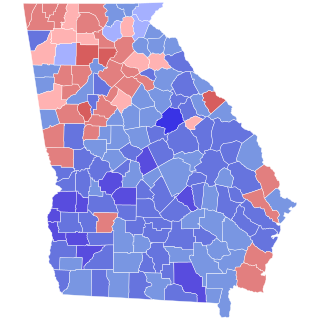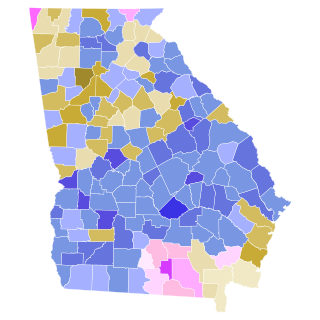
Oglethorpe County is a county located in the northeastern part of the U.S. state of Georgia. As of the 2020 census, the population was 14,825. The county seat is Lexington.

Commerce is a city in Jackson County, Georgia, 70 miles (110 km) northeast of Atlanta. As of the 2020 census, the city had a population of 7,387.
Lawrence v. Texas, 539 U.S. 558 (2003), is a landmark decision of the U.S. Supreme Court in which the Court ruled that U.S. state laws criminalizing sodomy between consenting adults are unconstitutional. The Court reaffirmed the concept of a "right to privacy" that earlier cases had found the U.S. Constitution provides, even though it is not explicitly enumerated. It based its ruling on the notions of personal autonomy to define one's own relationships and of American traditions of non-interference with any or all forms of private sexual activities between consenting adults.
Bowers v. Hardwick, 478 U.S. 186 (1986), was a landmark decision of the U.S. Supreme Court that upheld, in a 5–4 ruling, the constitutionality of a Georgia sodomy law criminalizing oral and anal sex in private between consenting adults, in this case with respect to homosexual sodomy, though the law did not differentiate between homosexual and heterosexual sodomy. It was overturned in Lawrence v. Texas (2003), though the statute had already been struck down by the Georgia Supreme Court in 1998.

John Hardy Isakson was an American businessman and politician who served as a United States senator from Georgia from 2005 to 2019. A member of the Republican Party, he previously served in the Georgia legislature and the United States House of Representatives.

Roy Eugene Barnes is an American attorney and politician who served as the 80th governor of Georgia from 1999 to 2003. As of 2025, he is the most recent Democrat to serve as governor of Georgia.

Powell v. State of Georgia, S98A0755, 270 Ga. 327, 510 S.E. 2d 18 (1998), was a decision of the Supreme Court of Georgia in the U.S. state of Georgia that overturned its law against sodomy within the state. The Court ruled that the Georgia Constitution granted a right to privacy, and that outlawing oral or anal sex between consenting adults was a violation of the state constitution, thus deeming it "unconstitutional".

Leah Ward Sears is an American jurist and former Chief Justice of the Supreme Court of Georgia. Sears was the first African-American female chief justice of a state supreme court in the United States. When she was first appointed as justice in 1992 by Governor Zell Miller, she became the first woman and youngest person to sit on Georgia's Supreme Court.

Paul Collins Broun Jr. is an American physician and politician who served as the U.S. representative for Georgia's 10th congressional district from 2007 to 2015. He is a member of the Republican Party and was a member of the Tea Party Caucus.

James Randolph Evans is an American lawyer and diplomat who served as the United States Ambassador to Luxembourg from 2018 to 2021. He presented his credentials on June 19, 2018, to the Grand Duke of Luxembourg. A member of the Republican Party from Georgia, he specializes in litigation, as well as professional, legal and government ethics. Evans is a partner at the global law firm Squire Patton Boggs.

The 1998 Georgia gubernatorial election was held on November 3, 1998. Incumbent Democratic governor Zell Miller was unable to seek re-election due to term limits, therefore creating an open seat. To replace him, State Representative Roy Barnes won the Democratic Party's nomination after a close and highly contested primary election, while businessman Guy Millner, who had run for governor and the United States Senate in the previous four years, won the nomination of the Republican Party.

The 1994 Georgia gubernatorial election occurred on November 8, 1994, to elect the next governor of Georgia from 1995 to 1999. Incumbent Democratic governor Zell Miller, first elected in 1990, ran for a second term. In his party's primary, Miller received three challengers, but easily prevailed with just over 70% of the vote. The contest for the Republican nomination, however, was a competitive race. As no candidate received a majority of the vote, John Knox and Guy Millner advanced to a run-off election. Millner was victorious and received the Republican nomination after garnering 59.41% of the vote.

Baker v. Wade 563 F.Supp 1121, rev'd 769 F.2nd 289 cert denied 478 US 1022 (1986) is a federal lawsuit challenging the legality of the sodomy law of the state of Texas. Plaintiff Donald Baker contended that the law violated his rights to privacy and equal protection. After a victory at trial, an appellate court reversed the lower court's decision and in the wake of its decision in Bowers v. Hardwick the Supreme Court of the United States refused to review it.

Samuel Scott Olens is an American lawyer and politician who served as Attorney General of Georgia. Olens was elected Georgia AG in 2010, resigning on November 1, 2016, following his appointment as President of Kennesaw State University. He subsequently resigned as KSU's president on February 15, 2018 and then served as counsel for Dentons global law firm. He was named partner Dentons' Public Policy practice in 2021.
Nancy Smith Schaefer was an American politician and conservative legislator who served in the Georgia State Senate from 2004 to 2008.
The state of Georgia mostly improved in its treatment of lesbian, gay, bisexual and transgender residents in the years after 1970, when LGBT residents began to openly establish events, organizations and outlets for fellow LGBT residents and increase in political empowerment.
Doe v. Commonwealth's Attorney of Richmond, 425 U.S. 901 (1976), is a decision by the Supreme Court of the United States which gave summary affirmation of a lower court ruling which upheld the U.S. state of Virginia's ban on homosexual sodomy.

The 1946 Georgia gubernatorial election took place on November 5, 1946, in order to elect the governor of Georgia.
Balch & Bingham LLP is a United States law firm based in Birmingham, Alabama.













